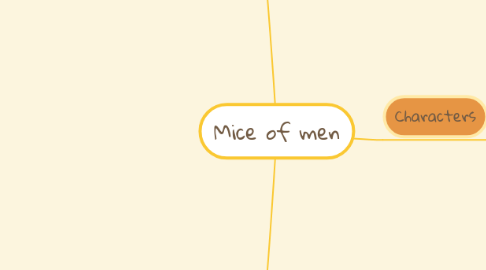
1. Themes
1.1. Loneliness
1.1.1. Men travel alone as “migrant workers”
1.1.2. George and Lennie travel together - unusual relationship
1.1.3. “I seen guys nealry crazy with loneliness”
1.1.4. Men all feel isolated
1.1.5. Will travel a long way for work opportunities
1.2. Violence
1.2.1. “You was pokin your big ears in our business” - aggression is a way to express identity
1.2.2. Constantly exploring the weaker characters
1.2.3. “Strung up on a tree” - chapter 4
1.2.3.1. In many ways crooks is a seen as a form of entertainment to the members of the ranch. For instance the way they go crooks to fight with smutty with which parallels can be drawn with the way some people viewed the lynching as a form of entertainment; taking photos and bringing their children
1.3. The American Dream
1.3.1. George and Lennie represent this idea that hard work gets you a better life
1.3.2. Everyone has the same dream - home ownership is an end goal
1.3.3. “We gonna get a little place” - Lennie always thinks about the dream
1.3.4. Men want to escape the life of a migrant workers
2. Context
2.1. Racism
2.1.1. Character : Crooks > isolated, nameless
2.1.1.1. “Crooks had reduced himself to nothing” - end of chapter 4
2.1.1.1.1. The treatment of crooks throughout the novel highlights the matter of fact view on racism. Crooks is isolated from the rest of the workers and has to constantly check his right and as a treat he was allowed to come into the bunk house
2.1.2. Segregation and inequality
2.1.3. “The negro stable buck”
2.1.4. Slavery is made illegal in 1865
2.1.4.1. Ethic minorities still treated as second class citizens
2.1.5. “A mailed copy of the California civil code of 1905” - award of his lack of rights
2.2. Sexism
2.2.1. Character : Curley’s Wife
2.2.1.1. Also namelsss
2.2.1.1.1. “Curley’s girl” - no real identity
2.2.1.2. Objectification
2.2.1.2.1. Treated as curley’s possession
2.2.1.3. “He’d put me in the pictures”
2.2.1.3.1. Curley’s wife is/was focused on an unrealistic future
2.2.2. Lack of equal treatment
2.2.2.1. Very few rights
2.2.2.2. Minority on the ranch
2.2.2.2.1. Only women
2.3. Ranch life
2.3.1. Often violent
2.3.1.1. Aggressive language + actions
2.3.2. “A guy on a ranch don’t never listen nor he don’t ask no questions”
2.3.3. View themselves as unimportant
2.3.3.1. Lack of awareness following the American dream
2.3.4. Lack of respect for each other
3. Characters
3.1. Lennie
3.1.1. Physical
3.1.1.1. Strength
3.1.2. Petting
3.1.2.1. Disaster
3.1.2.1.1. Puppy dies
3.1.3. Childlike trust
3.1.3.1. Belief in whatever George tells him
3.2. George
3.2.1. Dream
3.2.1.1. American
3.2.1.2. Protection
3.3. Curley
3.3.1. Boss son
3.3.1.1. He wants to show who’s boss even though he’s not the overall boss at the ranch - his dad is boss
3.3.2. Aggressive
3.3.2.1. He has an aggressive behaviour towards those weaker than himself, “I’m gonna get him. I’m going for my shotgun”
3.3.2.2. Looks for opportunities to fight
3.3.3. Wife
3.3.3.1. Jealous
3.3.3.2. Cares about revenge more than the death of his wife
3.4. Curley’s wife
3.4.1. Temptation
3.4.1.1. Flirtatious
3.4.2. Lonely, dreams broken
3.4.3. “I never get to talk to nobody”
3.4.3.1. The gender divides a society in the 1930s where women were considered lower class is portrayed thought curley’s wife in the book one way is by not even giving her a name and the derogatory language used to describe her - “bitch, tart” .
3.5. Workers
3.5.1. Candy
3.5.1.1. Killed dog
3.5.1.2. Mercy
3.5.1.3. Ageing
3.5.2. Carlson
3.5.2.1. Killed Candy’s dog
3.5.3. Slim
3.5.3.1. Driver mule skilled with dogs
3.5.3.2. Insightful
3.5.4. Crooks
3.5.4.1. Stable hand
3.5.4.2. Black
3.5.4.3. Isolated
3.6. Others
3.6.1. Aunt Clara
3.6.2. Boss
